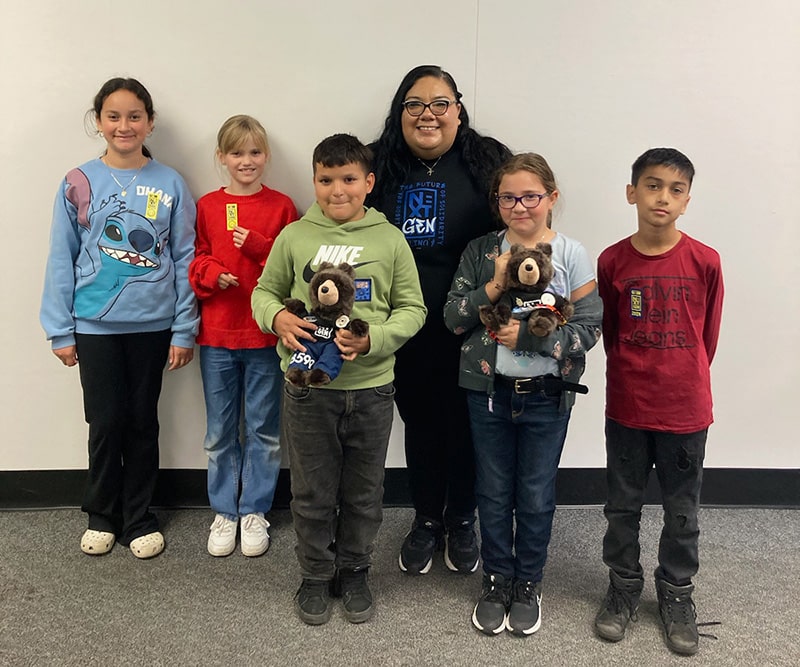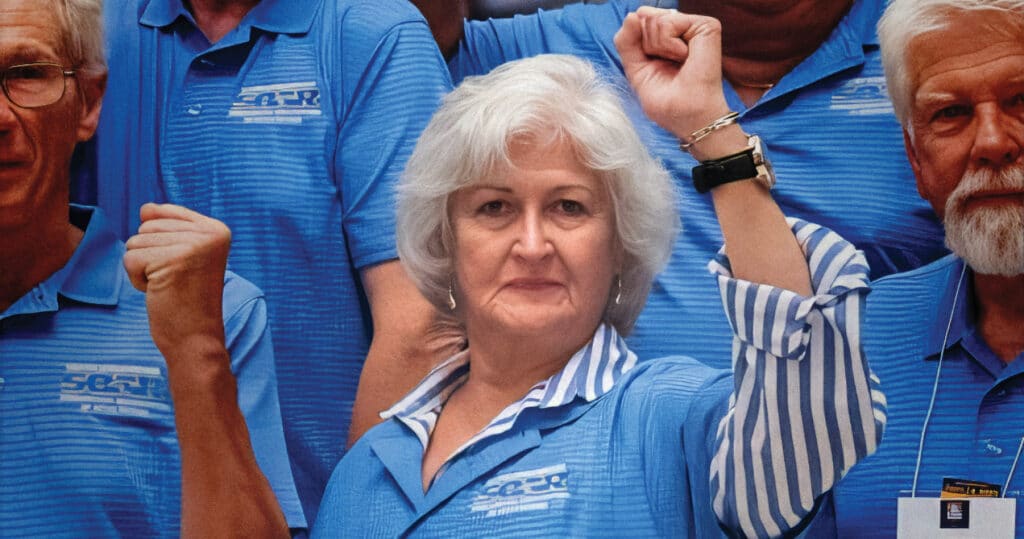Winning Chemistry: Members at Delaware’s Croda Atlas Point a Crucial Link in Supply Chain

Pedro Arturo Medina Andrade has only been a member of Local 12886 for about a year. In that short time, though, the USW difference has already become clear to him and his family.
At his previous non-union jobs, Andrade struggled to make ends meet. Now that he works at the unionized Croda Atlas Point chemical facility just south of Wilmington, Del., his children are able to participate in activities like ballet and soccer, and he is looking forward to taking a family trip to Mexico.
“The union gave me and my family security,” the kettle operator said. “I’ve been able to provide for my kids more than ever before.”
‘A Great Job’
The life-changing benefits of having a USW card are just as clear to the rest of the 150 members at Croda’s Atlas Point site, many of whom are deeply involved in their local union and their community.
Built on the banks of the Delaware River in 1937 as a gunpowder factory, the facility now turns out a variety of surfactants, which are essential ingredients in a wide range of consumer health and hygiene products, including makeup, shampoo, laundry and dish detergent, baby care products and other daily necessities.
Dave Sewell started at the facility as a high school graduate in 1978 and spent the next 45 years there. Now he is looking forward to the secure retirement he earned with his decades of service.
“It’s been a great job,” Sewell said. “There have been times when we really needed the union to help us through.”
Quality Control
Sewell works in the Croda quality lab, where he and other members like Mike McCoy and Jay Carey regularly test samples of the company’s products to make sure their composition is correct.
“We’re the last check and balance before the customer, so we want to make sure we have things right,” Carey said of his fellow lab workers.
Down the hall in another part of the lab, Brent Bowers carries out similar tasks in the opposite direction, taking finished products and breaking them down to their basic components to ensure the ratios are correct for the hundreds of different chemical compounds the company makes.
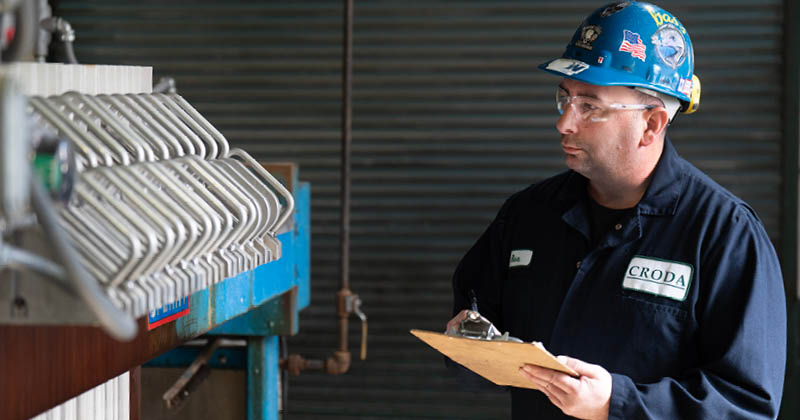
Committed to Safety
Both jobs are part of the work USW members do to ensure that the finished products they ship to other manufacturers fall within Croda’s strict quality-control standards. The extensive lab testing is also a good example of the USW and Croda’s shared commitment to maintaining a safe work environment.
“We have some of the best representation when it comes to health and safety,” Carey said. “Both the union and the company take it very seriously.”
For International Secretary-Treasurer John Shinn, who previously worked as a staff representative with Local 12886 and now oversees the union’s chemical sector, the effort to keep members safe is one that requires a commitment from all USW members, as well as close cooperation from employers. Shinn said the USW will be rolling out model safety and health language for all locals in the sector, which includes more than 350 units.
“Making sure every member at every workplace returns home safely at the end of their shift is the most important thing we do as a union,” he said.
Bowers, who has worked at the facility for 25 years and previously served for six and a half years as Local 12886 president, said that he was proud of the plant’s safety record, and also of how the USW has worked with Croda in recent years to create jobs.
“Everybody knows how important manufacturing jobs are,” Bowers said. “It feels good to be a part of that. It makes you feel like you’ve accomplished something.”
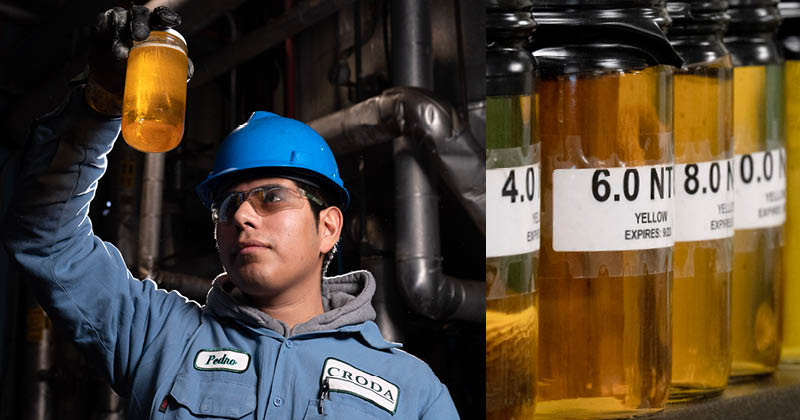
Sustainability Plan
The Atlas Point work force has grown by about 50 workers over the past seven years, said site director Chris Barnett, pointing in part to the recent addition of a corn-fueled bio-ethylene oxide plant that is the first of its kind in the United States. The project was part of Croda’s effort to shift toward renewable products and to cut its carbon footprint in half by 2030 and to net zero by 2050.
As part of that effort, Croda utilizes onsite solar and offsite wind generated electricity, as well as gas from a local landfill, to supply power for the Delaware site, the largest in the UK-based corporation founded in 1925 that employs almost 6,000 workers around the world.
“It’s a benefit to us to have a work force that takes a lot of pride in what we do,” Barnett said. “This site is one of the jewels of the company.”
Local 12886 President Ken Coale said that, according to a 2019 Penn State University study, the Croda plant has a $300 million annual impact on the local economy.
“Without us here,” he said, “there would be a big gap.”
Coale, who has worked at the plant for 26 years, said that he expects the local to add another 18 to 20 positions over the next few years.
“We’ve come a long way in my time here,” he said.
Bowers, whose father worked at the plant for 43 years and also served as local president, said previous generations of USW members fought to make sure that the jobs at Croda would be safe and secure and would provide family-supporting wages and benefits. It’s the duty of the current membership to build on that legacy, he said.
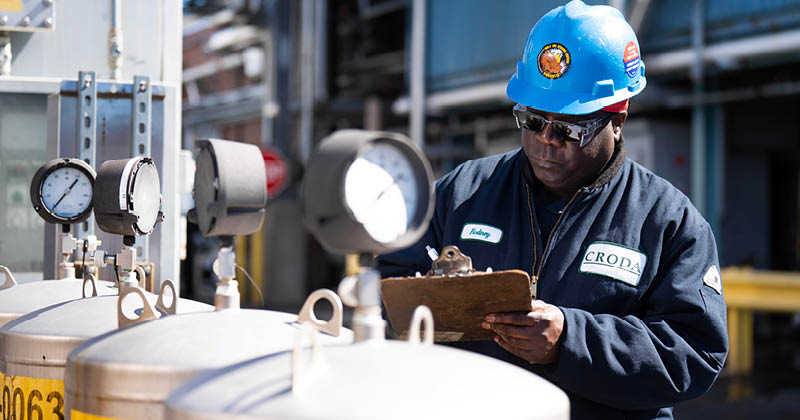
Pandemic Work
USW members at Croda helped to cement their own legacy when the COVID-19 pandemic began in early 2020. Because they make essential components of hand sanitizers, soaps and other products that helped control the spread of the virus, their workload only grew.
“There was a sense of purpose and a sense of pride to do something to get the country back on track,” said control room operator Shawn Barton. “We did what we had to do to help our country.”
The pandemic brought into sharp focus the factory’s importance as an indispensable link in the nation’s supply chain, said Amy Purnell, who has worked for Croda for two years after a stint at a non-union manufacturer.
“We work hard to provide our family members, our community and our country with grade-A materials,” Purnell said. “We take a lot of pride in that.”
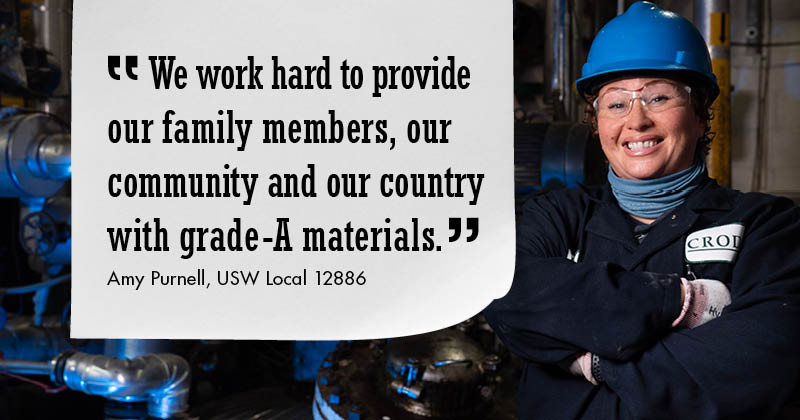
The presence of the USW at Croda ensures that hard work results in fair compensation, a safe work environment, and quality benefits, said Rodney Bullard.
A five-year veteran of Croda, Bullard knows the union difference well, having previously worked at a plant where there was no union, until he and his co-workers helped to organize one.
“The community is going to benefit from union jobs, just based on the pay and benefits alone,” Bullard said. Add to that the safety, sustainability, local involvement and other positive effects of the union, he said, and the impact of having Local 12886 as part of the Delaware community can’t be overstated.
The key, Bullard said, is that workers must recognize that union membership is a two-way street—to get something positive out of it, members must get involved.
“The union works for us,” Bullard said. “And we work for them.”
Chemical Solutions
To sign up to receive “Chemical Solutions,” the USW’s newsletter for chemical workers, visit usw.to/chemicalsolutions.
By clicking Sign Up you're confirming that you agree with our Terms and Conditions.
Recent News Articles
Want to Learn More?
See how the USW is making a real difference in our communities and our workplaces.
